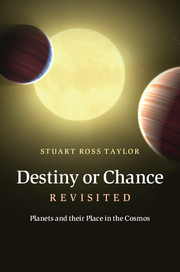1 - Prologue
Published online by Cambridge University Press: 05 October 2012
Summary
WHAT IS A PLANET?
“When we think of a planet, our first conception is a body like Earth with an atmosphere, continents and oceans” [1].
This question is less important than one might suppose, given the uproar about the status of Pluto. Although labels are useful, trying to define a planet runs into the philosophical difficulty of attempting to classify any set of randomly assembled products. A bewildering array of objects form in the nebular disks around stars. These items include in our system, dust, asteroids, Trojans, Centaurs, comets, TNOs, our eight planets from tiny Mercury to mighty Jupiter and their 160 satellites. All differ from one another in some salient manner. A rational view would merely define our planetary system as having four planets (the gas and ice giants) with some assorted rocky rubble sunwards and icy rubble beyond. The significant question is how did they form and evolve, not what pigeonholes this variety of objects can be forced into. The strange varieties of exoplanets and brown dwarfs have added much extra complexity [2].
- Type
- Chapter
- Information
- Destiny or Chance RevisitedPlanets and their Place in the Cosmos, pp. 1 - 25Publisher: Cambridge University PressPrint publication year: 2012



